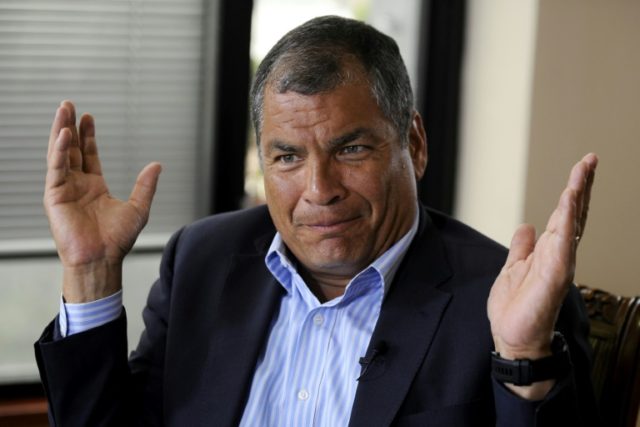A judge in Ecuador ordered the arrest Tuesday of former President Rafael Correa, a staunch anti-American leftist whose tenure was defined by his friendly ties with Venezuela, China, and Cuba and has reportedly begun proceedings with Interpol to aid in his detention.
Correa stands accused of having paid criminals in Colombia to kidnap an opposition legislator visiting that country in 2012, charges Correa, currently residing in Belgium, denies. The government of his successor, the relatively moderate leftist Lenin Moreno, has also launched investigations into Correa-era deals to sell oil to China that Quito now contends are highly unfavorable to the Latin American country.
Moreno won the Ecuadorian presidency in 2017 as part of Correa’s National Alliance (AP) party. Correa has since left the party and condemned Moreno, arguing that the current president seeks to undo much of his Marxist legacy.
Prior to the news Tuesday, Correa had reportedly begun proceedings to request political asylum in Belgium, predicting that Ecuador would soon issue a warrant for his arrest.
On Tuesday, the Ecuadorian prosecutors’ office confirmed that presiding Judge Daniella Camacho “orders preventive prison for ex-president Rafael C. for his alleged participation in the crime of illicit association and kidnapping” and that “a request will be submitted to Interpol for his capture, with the aim of extraditing him.”
The illicit association and kidnapping charges stem from evidence suggesting that Correa hired criminals in Colombia to abduct opposition lawmaker Fernando Balda. Balda was one of the most vocal opponents to Correa’s rule while he was in office, repeatedly accusing him and his top aides of corruption before eventually fleeing to Colombia, according to Argentina’s Clarín newspaper. Balda filed charges after Colombian police, who thwarted the abduction, found evidence tying Correa to the incident. Correa ran the country with belligerence towards the opposition, on one occasion challenging another opposition lawmaker to a fist fight and demanding laws to silence anti-socialist journalists in the country. Prior to his rift with Moreno, Correa, still president, warned voters to “behave well” and vote for Moreno or he would use an obscure legal procedural rule to invalidate the election.
As Colombia’s El Espectador explains, Camacho ordered the arrest of Correa on Tuesday not on the kidnapping charges, which are still being processed, but because Correa violated her order to present himself to Ecuadorian courts every two weeks to prevent him escaping the law. Correa, who moved to Belgium immediately after stepping down from power last year, instead appeared before Belgium’s Ecuadorian consulate, which Camacho determined not to meet the requirements of her order.
Correa, still free in Belgium, took to Twitter on Tuesday evening to thank supporters for “displays of solidarity before this new and grave assault on justice and my rights.”
“I am fine, don’t worry. They will seek to humiliate us and makes us have a bad time, but a monstrosity like this will NEVER prosper in a state of rights like Belgium,” Correa tweeted.
Correa also accused Balda of being part of a larger conspiracy led by Moreno against him, claiming that Balda had predicted that Interpol would issue a red alert for Correa in the near future in November. “Did he guess, or is he part of a conspiracy?” Correa asked.
“This decision is arbitrary, it is a lie, it is defamatory. I do not believe they are seeking justice but rather revenge,” Correa attorney Caupolican Ochoa told reporters on Tuesday.
Prior to the court’s declaration Tuesday, Clarín reported that Correa was likely to begin the political asylum process in Belgium “in the event that Ecuadorian judges seek preventative detention against him or force him to return to the country.” Prosecutors filed the charges against Correa on Monday.
This is the latest legal incident implicating Correa since he stepped down from the presidency. In February, Correa – in Ecuador to campaign against term limits for presidents, which was on a referendum ballot that month and lost – testified before the courts in the case of several oil contracts that significantly limited the nation’s profits by promising discounted prices to the Communist Party of China. Among the first moves Moreno made as president was to begin attempting to renegotiate Correa’s deals with nations like China, which guaranteed that he received support from like-minded allies in the face of growing pressure in Latin America against Bolivarian socialism.
Correa is far from the only Bolivarian socialist leader facing legal troubles. In Brazil, former leftist president Luiz Inácio Lula da Silva was sentenced this year to 12 years in prison for allegedly taking millions in bribes as part of the corruption scheme known as “Operation Car Wash.” Nicolás Maduro, the dictator of Venezuela, faces a preliminary investigation at the International Criminal Court, which tries war crimes and crimes against humanity.

COMMENTS
Please let us know if you're having issues with commenting.